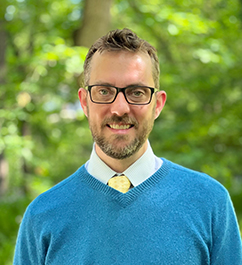Second NSF Grant Expands WCER Study of College/Career Success of Student Military
Researcher using $1.4M grant to track military students/veterans from universities outside Wisconsin, too
July 14, 2022 | By WCER Communications

VETWAYS Principal Investigator Ross Benbow hopes to find ways to support the transition of diverse students into STEM careers.
WCER researcher Ross Benbow has received a second, larger grant from the National Science Foundation (NSF) to substantially expand his ongoing, mixed-methods study of the college experiences of undergraduate students who are military members or military veterans.
The original project, funded by a three-year, $556,000 grant from NSF in 2019, focused on how social support networks connect with the college-to-workforce paths of student military or military veterans at five UW System institutions. The second NSF grant, this one for $1,443,668 over the next four years, allows that same focus to expand to selected universities around the country.
Known as the Veteran Education to Workforce Affinity and Success Study (VETWAYS), the project uses surveys and interviews with students and educators to gather information at the selected institutions, originally limited to UW–Madison and the Milwaukee, Oshkosh, Green Bay, and Stout campuses.
“Basically the project focuses on better understanding how social support networks for students who are active military members or military veterans influence their success in college and their transitions into jobs after graduation,” says Benbow, the study’s principal investigator. “The new funding will help us continue work from our first study as we now follow students from several Wisconsin universities along their career paths. It will also allow us to expand our focus to students from several other universities around the country, particularly majority-minority institutions.”
The project abstract notes findings could help broaden participation in the science, technology, engineering, and mathematics (STEM) workforce, as service members are more likely to come from traditionally disadvantaged groups, such as first-generation students, students of color, older students, and married students with more off-campus responsibilities.
“Student service members/veterans (SSM/Vs) represent an emergent population with the diversity and skills to broaden the STEM workforce,” Benbow says. “The nation aims to bring better trained and diverse college graduates into the STEM workforce, yet little research focuses on SSM/Vs in 4-year university STEM programs, their trajectories into STEM careers, or how SSM/V trajectories and persistence associate with social support networks—compilations of social ties shown to be particularly important to SSM/Vs. This gap in knowledge presents a considerable opportunity for fundamental, multidisciplinary research.”
More specifically, the new grant will allow expansion of the project research “longitudinally, contextually, and comparatively” by:
- extending data collection further along existing research subjects’ STEM career trajectories.
- adding a new cohort of SSM/Vs from more diverse institutions.
- comparing support networks and career trajectories among STEM and non-STEM SSM/Vs in Wisconsin, in “military-centric” institutions, and among non-SSM/Vs.
The proposed work seeks to support the transition of diverse undergraduates into post-university STEM careers, with findings to be distributed to SSM/V service coordinators, university leaders, policymakers, scholars, and the wider public.
“With the aim of developing new scientific theories to better understand STEM workforce development processes among an under-supported population,” Benbow says, “this fundamental study will address gaps in scholarly knowledge on the career trajectories, social support characteristics, and perceptions of SSM/Vs as they move through university into STEM professions.”


